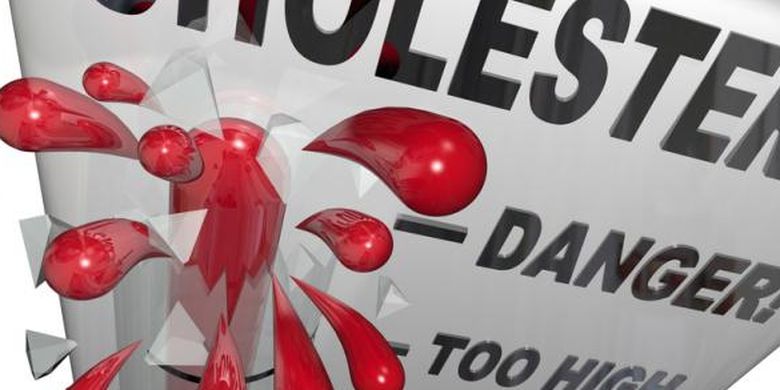KOMPAS.com – Cholesterol is a type of waxy substance found in the blood and body cells.
Your liver produces most of the cholesterol in the body.
The rest comes from the food you eat.
Cholesterol travels in your blood bundled in packages called lipoproteins.
Also read: 8 Signs of High Cholesterol that Are Often Unrecognized
Cholesterol comes in two forms, namely:
- Low-density lipoprotein (LDL) is the unhealthy type of “bad” cholesterol. LDL cholesterol can build up in the arteries and form fatty waxy deposits called plaque.
- High-density lipoprotein (HDL) is the “good” and healthy type of cholesterol. It transports excess cholesterol from the arteries to the liver, which removes it from your body.
Cholesterol has often been considered as a bad substance that causes various dangerous diseases.
In fact, not so if the cholesterol level in the body is within normal limits.
Your body needs cholesterol, among other things, to make hormones, vitamin D, and digestive juices.
Cholesterol also helps your organs function properly.
However, having too much LDL cholesterol in the blood can be a problem.
High LDL cholesterol over time can damage your arteries, contributing to it heart disease, and increases the risk of stroke.
Also read: 9 Causes of High Triglycerides to Watch Out for
Checking cholesterol regularly and lowering the risk of heart disease with diet, exercise, lifestyle changes, and medication, can help reduce the risk of complications associated with heart disease and improve quality of life.
In blood tests, adults can be diagnosed with high cholesterol when their cholesterol levels reach> 249 mg / dL.
This condition is important not to be left alone.
Here are a few high cholesterol effect on a good body are anticipated:
1. Cardiovascular and circulatory system
When you have too much LDL cholesterol in your body, it can build up in your arteries, clogging them and making them less flexible.
Also read: What Is Normal Cholesterol In The Blood?
Hardening of the arteries is called atherosclerosis.
Blood doesn’t flow properly through stiff arteries.
So your heart has to work harder to push the blood through.
Over time, as plaque builds up in your arteries, you can develop heart disease.
The buildup of plaque in the coronary arteries can interfere with the flow of oxygen-rich blood to your heart muscle. This can cause chest pain called angina.
Angina is not heart attack, but is a temporary interruption of blood flow. This is a warning that you are at risk for a heart attack.
A piece of plaque can eventually break off and form a clot or an artery can continue to narrow which can completely block blood flow to your heart. This condition can cause a heart attack.
If this process occurs in an artery leading to the brain or in the brain, it can cause a stroke.
Plaque can also block blood flow to the arteries that supply blood to your intestinal tract, legs and feet. This is called peripheral artery disease (PAD).
2. Endocrine system
Your body’s hormone-producing glands use cholesterol to make hormones like estrogen, testosterone, and cortisol.
Also read: 12 Foods That Contain High Cholesterol
Hormones can also affect your body’s cholesterol levels.
Research has shown that when estrogen levels increase during a woman’s menstrual cycle, HDL cholesterol levels also go up, and LDL cholesterol levels decrease.
This may be one reason why a woman’s risk of developing heart disease increases after menopause, when estrogen levels drop.
A decrease in thyroid hormone production (hypothyroidism) can also lead to an increase in total and LDL cholesterol.
Excess thyroid hormone (hyperthyroidism) has the opposite effect.
Meanwhile, androgen deprivation therapy (ADT), a therapy aimed at lowering male hormone levels in order to stop the growth of prostate cancer, can increase LDL cholesterol levels.
Lack of growth hormone can also increase LDL cholesterol levels.
Also read: 10 Foods to Increase Good Cholesterol
3. Nervous system
Cholesterol is an essential component of the human brain.
In fact, the brain contains about 25 percent of the body’s total cholesterol supply.
These fats are important for the development and protection of nerve cells, which allow the brain to communicate with the rest of the body.
Although you need very little cholesterol for your brain to function optimally, too much cholesterol can be damaging.
Excess cholesterol in the arteries can cause a stroke, which is an interruption of blood flow that can damage parts of the brain, causing memory loss, movement, difficulty swallowing and speaking, and other functions.
High cholesterol itself also has implications for memory loss and mental function.
Where, have blood cholesterol high levels can accelerate the formation of beta-amyloid plaques, which are sticky protein deposits that damage the brain in people with Alzheimer’s disease.
Also read: 8 Fruits That Can Lower High Cholesterol Naturally
4. Digestive system
In the digestive system, cholesterol is essential for the production of bile, a substance that helps your body break down food and absorb nutrients in your intestines.
But if you have too much cholesterol in your bile, the excess will form crystals and then hard stones in your gallbladder. Gallstones can be very painful.
Keeping an eye on your cholesterol levels with recommended blood tests and lowering your risk of heart disease will help improve your overall quality of life.
Also read: Where do gallstones hurt?
– .


